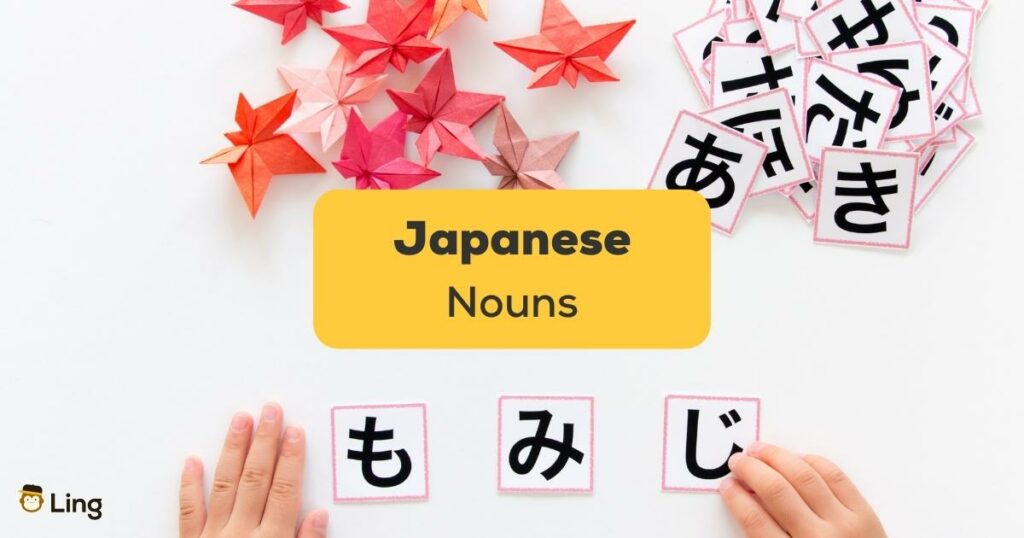Unsurprisingly, if you simply use a noun in Japanese, people can get what you mean. So, learning Japanese nouns is a great way to expand your Japanese vocabulary and will facilitate easy communication with locals.
Learning Japanese is absolutely fun and engaging. However, many of you will think that it’s a hard language to even memorize.
But if you don’t want to study vocabulary you might never use, keep reading this post because we’ll introduce you to the most frequent Japanese nouns you need daily!
Basic Japanese Nouns At A Glance
It’s typical practice for anyone beginning to study a foreign language to start with understanding basic greetings and everyday phrases. So, learning Japanese greetings and common expressions in preparation for a trip to Japan is an excellent first step for anyone interested in studying the Japanese language. But you might get overwhelmed with what it looks like.
In contrast to the English language, nouns in Japanese do not require articles like “a” and “the.” Also, unlike in English, where the addition of “s” or “es” denotes the singular and plural form, there are no rules for determining whether a single or plural noun is in Japanese.
Hence, Japanese learners can feel free to use proper nouns without fearing making mistakes here.

Common Nouns In Japanese You Need In Everyday Life
Now we begin learning further about Japanese grammar! Here are some of the most common nouns in Japanese that you will definitely hear native speakers use daily.
If you want to learn Japanese for everyday usages, like asking for the restroom (which one should typically use Japanese adverbs) or placing an order at a restaurant, but you don’t have time to learn how to construct a complete sentence since you need common Japanese words to use right now, then bookmark this article and start practicing today.
So, chill out and remember these common Japanese nouns list now!
Japanese Nouns For Date And Time
This is a list of the Japanese words for date and time that you’ll need to use daily.
| English Nouns | Japanese Nouns | Romaji | Sound |
|---|---|---|---|
| Week | 週 | Shuu | |
| Year | 年 | Toshi | |
| Second | 秒 | Byou | |
| Hour | 時間 | Jikan | |
| Minute | 分 | Fun | |
| Today | 今日 | Kyou | |
| Tomorrow | 明日 | Ashita | |
| Yesterday | 昨日 | Kinou |
Most Japanese learners chose the Ling app to help them succeed, so why not join them? Download the Ling app from the Google Play Store and Apple App Store now, and prepare to be fluent in Japanese soon!
Japanese Nouns For Food And Drink
Do you love Japanese food? Then surely you will love to spend some time at Japanese restaurants! Here are the most common Japanese words for food that will come in handy if you visit Japan.
| English Nouns | Japanese Nouns | Romaji | Sound |
|---|---|---|---|
| Food | 料理 | Ryouri | |
| Tea | 茶 | Cha | |
| Water | 水 | Mizu | |
| Coffee | コーヒー | Kōhī | |
| Beer | ビール | Bīru | |
| Ice | 氷 | Kouri | |
| Beef | 牛肉 | Gyuu niku | |
| Fish | 魚 | Sakana | |
| Pork | 豚肉 | Buta niku | |
| Chicken | 鶏肉 | Tori niku |

Japanese Nouns For People
Here are essential words about the Japanese people to start practicing. You can also try to pronounce these words with your Japanese friend and make sure to check if you are speaking them properly.

Japanese Nouns For Places
Knowing some Japanese nouns for places is a great way to enhance your experience and communication skills in Japan. Whether you want to find the best hotel accommodation, a supermarket to buy groceries, or a park where you can chat with the locals, first, you need to learn these nouns. They will come in handy in case you need to ask for directions!
Japanese Nouns For Home Appliances
Have you ever wondered how to say television in Japanese? Let’s learn the most basic words in Japanese about home appliances you’ll often use.
| English Nouns | Japanese Nouns | Romaji | Sound |
|---|---|---|---|
| Computer | コンピューター | Konpyuutaa | |
| Bed | ベッド | Beddo | |
| Sofa | ソファー | Sofaa | |
| Television | テレビ | Terebi | |
| Cellphone | 携帯電話 | Keitai denwa | |
| Table | テーブル | Teeburu | |
| Chair | 椅子 | Isu |
Japanese Nouns For Clothing
These Japanese words for clothing will help you whenever you need to buy items or ask for fashion advice from the locals.
| English Nouns | Japanese Nouns | Romaji | Sound |
|---|---|---|---|
| Shoe | 靴 | Kutsu | |
| Shirt | シャツ | Shatsu | |
| Sock | 靴下 | Kutsushita | |
| Pants | ズボン | Zubon | |
| Skirt | スカート | Sukaato |

Japanese Nouns For Weather
Here are 3 basic Japanese words about the weather.
| English Nouns | Japanese Nouns | Romaji | Sound |
|---|---|---|---|
| Weather | てんき | tenki | |
| Rain | あめ | ame | |
| Sun | たいよう | taiyou | |
| Windy | かぜ | kaze | |
| Cloudy | くもり | kumori | |
| Snow | ゆき | yuki | |
| Hot | あつい | atsui | |
| Cold | さむい | samui | |
| Temperature | きおん | kion | |
| Rainbow | にじ | niji |
Japanese Nouns For Body Parts
Here are helpful Japanese words about body parts. Remember, you can use these nouns along with Japanese pronouns to emphasize what you are talking about!
Common Japanese Abstract Nouns
You can also find several examples of abstract nouns in Japanese when watching J-dramas. They use these words for the titles, for example.
| English Nouns | Japanese Nouns | Romaji | Sound |
|---|---|---|---|
| Beauty | 美 | Bi | |
| Death | 死 | Shi | |
| Goodness | 善 | Zen | |
| Happiness | 幸 | Kou | |
| Love | 愛 | Ai | |
| Heart | 心 | Kokoro | |
| Life | 命 | Mei | |
| Wisdom | 智慧 | Chie | |
| Wish | 顔 | Gan |
In Summary
You’ll be able to get around easily and have an enriching experience in Japan if you learn these essential words for nouns in Japanese. Slowly you will notice a significant improvement in your sentence-building abilities!
If you’re worried about building complex Japanese sentences and speaking, remember that communicating with Japanese nouns is a great place to start.
Do you wish you had a more extensive vocabulary in Japanese? Then, we’ve got the top app in the store for you!
Learn Japanese With The Ling App
Let’s use the Ling app to increase our Japanese vocabulary so we can feel comfortable constructing sentences from scratch in Japanese. We give you access to native Japanese pronunciation so you can hear how they pronounce various phrases and sentences and get familiar with it!


































































